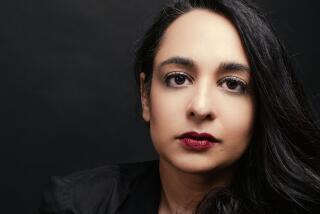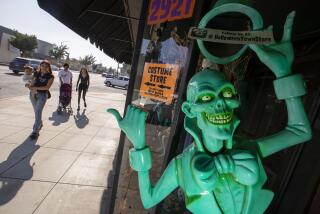For Arabs, a Man of Renown in Hollywood
- Share via
Within Hollywood, Moustapha Akkad was the little-known producer of the “Halloween” horror movie series.
But within the Arab American world, he was the famous filmmaker whose movies defied stereotypes and portrayed Islam in a positive light.
On Friday, the community mourned Akkad, 72, who, along with his daughter, was among at least 56 people killed in suicide bombings at three hotels in Amman, Jordan.
“It’s devastating,” said UCLA law professor Khaled Abou El Fadl, a longtime friend of Akkad. “Terrorism that claims to be Islamic-motivated has killed so many of the gifted assets of the Muslim world. Here it claims another remarkably creative, intelligent and passionate humanitarian.”
Akkad, who was born in Syria, came to Los Angeles in 1954 with only a few hundred dollars in his pocket. He got off a bus, heard a man speaking Arabic and asked directions to Westwood. While studying film at UCLA, he worked as a houseboy in a Beverly Hills home, living in a room behind the kitchen. His entry into Hollywood, with two lavish sagas, “The Lion of the Desert” and “The Message,” capped a Frank Capra-like story line.
Though the “Halloween” movies were a successful franchise that spanned decades, Akkad, who lived in Brentwood, saw them as the bread and butter that helped finance his historic and religious movies, Abou El Fadl said.
“He was known as Mr. Halloween ... he wore that cloak reluctantly,” said Paul Freeman, who attended UCLA with Akkad and produced four of the “Halloween” movies. “That didn’t fit the image he’d want to be remembered by, but he accepted it because so many people enjoyed the movies.”
Akkad was far more passionate about his other work, friends and colleagues said.
He produced and directed “The Message,” a 1976 film that depicted the life of the Prophet Muhammad. Akkad filmed two versions of every scene, one with an English-speaking cast, the other with an Arabic-speaking one.
When the movie opened, it stirred controversy and prompted one Muslim group to take more than 100 people hostage in Washington, D.C. Five years later, Akkad produced “The Lion of the Desert,” which told of the Libyan revolt against the occupying Italian army. “It was the first time American audiences applauded for an Arab,” Akkad told The Times in 1991.
Hollywood films have long portrayed Arabs as “bombers, billionaires and belly dancers,” said Anthony Saidy, interim president of the local chapter of the American-Arab Anti-Discrimination Committee, which honored Akkad for his work.
Irwin Yablans, who partnered with Akkad on “The Message” and “Halloween,” said they worked well together, despite having widely different backgrounds. “Here was a Jew and an Arab, and we had tremendous success,” Yablans said.
Akkad was steeped in Middle Eastern history but was not involved in politics or deeply religious, Yablans and others said. But he didn’t hesitate to talk about either subject.
“He’d like to be remembered as a guy who tried to do things to show that the Arab world wasn’t all evil ... that there was goodness to the religion,” Freeman said. “For all practical purposes, he was the only Arab producer in Hollywood, at least of that stature. He was the David Lean of the Middle East; he was regarded like that in that part of the world.”
John Carpenter, director of the first three “Halloween” films, said Akkad was a creative guy with a passion for film.
“Moustapha did a great thing for me when I was a young man with just two features to my credit,” the director said. “He let me make a low-budget movie, ‘Halloween,’ with complete creative control.”
Carpenter said he wondered why Akkad didn’t direct later in life. “His movies were pretty ambitious, and I wonder if they’d been better received, if he might have pursued that course,” he said.
Rick Rosenthal, who directed “Halloween 2” and “Halloween Resurrection,” said Akkad was a “very urbane, polished man with a twinkle in his eye. There’s a breed of producer, maybe more old school than current day, who are cosmopolitan and charming. He was old-school.”
Akkad maintained close ties with the Arab world. Former Jordanian Prime Minister Tahir Masry was a good friend, and had eaten lunch with the producer the day of the bombings. Masry visited Akkad at his hospital bedside before he died.
“He had a good sense of what he wanted to do,” Masry said. “He wanted to establish an Arab cinema production company to make big productions about Arab history and historical figures.”
Among the projects that Akkad envisioned were a biography of legendary Muslim sultan and conqueror Saladin. Although Akkad lobbied Arab business and political leaders for funding and logistical support, including a personal audience with the emir of Qatar, he became discouraged and all but abandoned his efforts, Masry said.
Akkad traveled to the Middle East often, most frequently to Lebanon to visit his 34-year-old daughter, Rima Akkad Monla, a USC graduate who married a Lebanese man and had settled in Beirut.
Akkad and his daughter were attending a wedding at the Radisson SAS hotel in Amman when the bombings occurred Wednesday. She died immediately and Akkad died of his injuries Friday morning.
“Rima was his everything,” said Christi Sinkus, a friend and office manager at Akkad’s company, Trancas International Films. “We knew that if his injuries didn’t kill him, the news of his daughter would.”
Akkad also had three sons -- two from his first marriage to Patricia Akkad, and one from his second marriage to Suha Akkad. He will be buried in his hometown of Allepo, Syria, friends said.
Amar Mansour, a close friend who lives in San Diego, said Akkad was a generous man who spent his free time with his family and friends and doing charity work. “The community is devastated,” she said Friday. “He is a legacy.”
Times staff writer Ashraf Khalil in Amman contributed to this report.
More to Read
Only good movies
Get the Indie Focus newsletter, Mark Olsen's weekly guide to the world of cinema.
You may occasionally receive promotional content from the Los Angeles Times.










